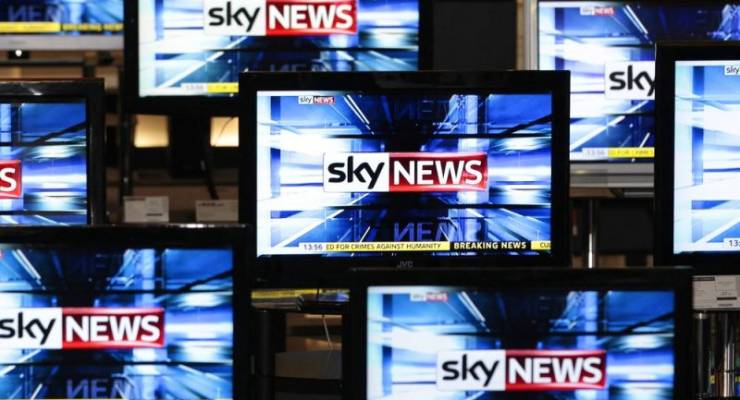
The moment when Victorian Transport Minister Jacinta Allan announced she was removing Sky from Victorian stations marked a “the emperor has no clothes” moment for the political power and influence of News Corp, leaving them flat-footed, caught in the centre of the racism debate.
At the same time, the withdrawal of advertisers (exaggerated into “dozens” by ministerial hyperbole) poses an existential threat to the revenue flows of the broadcaster.
All this came as the company’s annual financial figures showed a touch less of the bad news of long term decline and as Rupert Murdoch popped up in an agency photo at Sydney Airport in the continued careful curation of his public image following the New Year boating incident.
Ever since the Courier-Mail failed to re-elect the Queensland LNP government back in 2015, there’s been a growing acceptance of News Corp’s imperial nudity. But enduring political caution has kept MPs quiet.
The response within News Corp media last week showed why. On the one hand, the splutterings of “fascism” from the nether regions of Sky itself; on the other, some of the company’s outstanding talents came out to argue the case.
Some of the response was nit-picking — only three advertisers had withdrawn, not dozens; the evening werewolf hours of Sky are not included in the transport package. Some, was procedural — who advised you? Who’s complained?
The true heart of the argument is whether the right to freedom of expression implies an obligation on platforms to amplify your voice, an Australian version of the current US debate about banning the alt-right InfoWars from the big tech platforms.
Sky’s defenders sought to restrict the discussion to the single offensive interview with Australian fascist Blair Cottrell, or at least to those witching hours of Sky’s after dark programming.
But, for News’ critics, the Cottrell interview was part of a pattern, following on from the long-running “African gangs” saga. Exhibit A: Andrew Bolt’s “Foreign Invasion” column, running, apparently without challenge, in all the News Corp tabloids (and The West Australian).
Back on Sky, Peta Credlin dismissed accusations of racism, saying they were about bullying “ordinary people in everyday suburbs” who are concerned about immigration.
In The Australian, Caroline Overington called the Sky withdrawal “100% political” — and it is, although perhaps not in the way she means.
It’s political because News Corp has allowed itself to be positioned as the centre of the anti-immigration debate. Of course, it’s a big company. Its many journalists have diverse views, and some of the strongest critics of Sky after dark or the Bolt column have been internal.
But the company is positioned by economics. The challenge can be seen in last week’s financial reports. Increasingly, its news and information segment is dependent on reader revenues, not advertising.
In the June 30 quarter, the company says, digital revenues for Dow Jones and the newspaper mastheads represented 33% of total revenues, largely driven through increased subscriptions, with the company claiming 415,600 digital subscribers in Australia. At the same time, subscribers of Foxtel (the carrier of Sky) are flat at about 2.8 million.
Customer revenues depend on demographic targeting. For News Corp, that’s the “grumpy old men” demographic — over 45, often third generation or more, usually Anglo descent. The settler (or settler-identifying) class or, as Andrew Bolt calls them, “us”.
There are enough people in this demographic with sufficient psychographic “grumpiness” to be prepared to pull out their wallets to pay for a subscription. But to keep them paying, you need to feed their sense of resentment — almost a sense of loss — at social change. In Australia, right now, that means feeding concerns about all those people who are not “us”.
Bad news: it’s not a demographic that attracts advertisers, particularly of fast moving consumer goods. Worse, advertising is seen as endorsing the confirmation bias generated by the resentment machine, damaging the advertiser in the minds of more attractive demographics.
That’s the vulnerable point of attack for activists like Sleeping Giants. And it’s why political leaders, dependent on their own voting demographics, see more gain in poking the News Corp bear than in leaving it alone.








I thought I would try and stop Sky News all those associated right wing jerks from appearing on my screen as part of my Foxtel subscription. No reply from my request to discontinue that part of my package.
I love that analogy of “poking the newscorp bear”…let’s all sharpen our sticks and have a go, there isn’t much life left in it.
“imperial nudity”, thanks.
No doubt the coal lobby got a great advertising deal judging from how frequently a manufacturer tells of job losses due to the increased cost of energy. Notable that he fails to ask why gas costs him so much, but likely he doesn’t want to embarass the Govt decision to allow multi nationals free rein on exports, not reserving any quota for Australia.
Along with playing politics, Murdoch being on the Advisory Board of US giant Genie Oil & Gas (along with that Dick Cheney) wouldn’t have anything to do with the constant flow of positive advertorial PR (and the edited/ignorance of bad news) for ‘fossil fools’ like coal, Adani et al gushing from his oily rags, would it?